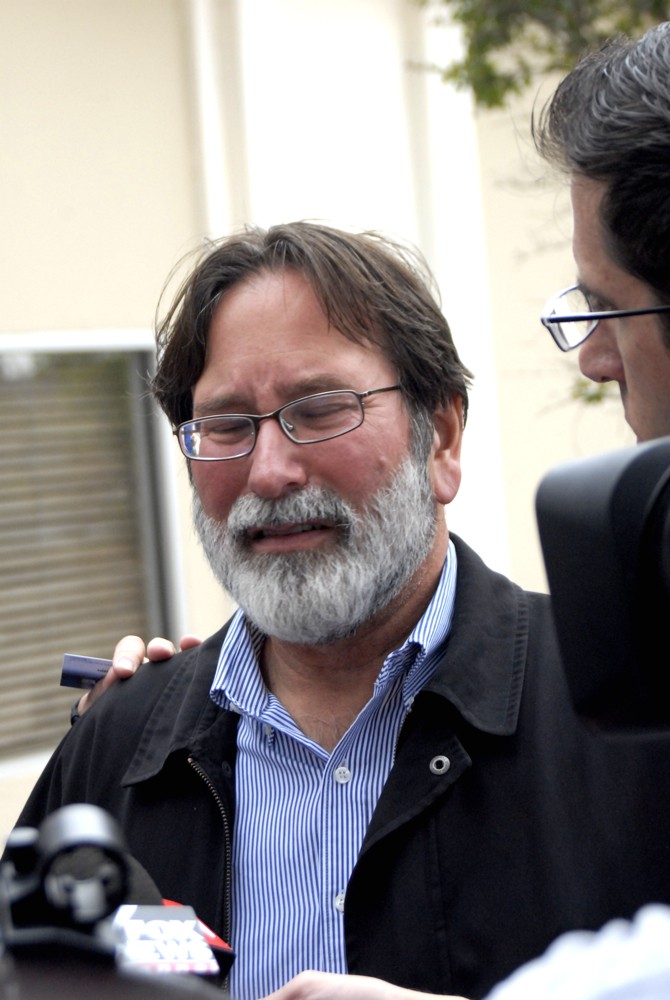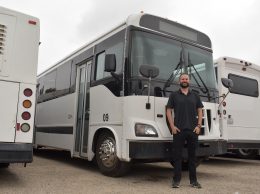Isla Vista shooting spree reignites gun control debate
IN THIS ARTICLE
- South Coast Topic
- Marissa Wenzke Author
By Marissa Wenzke Friday, May 30th, 2014

Richard Martinez, father of shooting victim Chris Martinez, described his son as a “very good student.” (Stephen Nellis / Business Times photo)
“When will this insanity stop? When will enough people say, ‘Stop this madness, we don’t have to live like this?’ Too many have died. We should say to ourselves, ‘Not one more,’ ” Richard Martinez told reporters after his son was shot and killed in the Isla Vista murder spree that left seven people dead on May 23.
Richard Martinez, a Santa Maria attorney, is the father of 20-year-old UC Santa Barbara student Chris Martinez, the final victim in the Isla Vista murder rampage who was shot dead in IV Deli Mart.
Elliot Rodger, a 22-year-old Santa Barbara City College student, stabbed, shot and ran students over in a 14-block mass murder in Isla Vista that killed six victims and injured 13. In the aftermath of the massacre, Richard Martinez pointed to pro-gun policymaking influenced by the National Rifle Association and lax gun-control laws as leading causes of the tragedy, which unfolded alongside the UCSB campus. The NRA has not commented.
Martinez’s plea and calls to action from Sen. Dianne Feinstein and other lawmakers have thrust questions about guns and the ease with which mentally ill people can obtain them into the center of the debate about what caused the massacre in the small beachfront student community.
At the state level, Assemblyman Das Williams, D-Santa Barbara, has already introduced a bill that would create a “gun violence restraining order.” Under current law, therapists can notify law enforcement if a client is at risk of committing a violent act, which gives police the authority to investigate the person and potentially seize existing guns or block their purchase. The proposed bill would extend that reporting power to “concerned family members, friends and intimate partners.”
“The tragic incident in my hometown of Isla Vista is not a result of gun laws failing. Rather, it is a horrific example of how our mental health laws and gun control laws are not working together,” said Williams said in a statement.
Williams’ bill comes as questions are emerging over how Rodger slipped through the cracks of California’s mental health system and handgun background check system to acquire three 9mm semiautomatic handguns, all purchased legally and under his name.
Rodger’s family had requested a welfare check by local police in April, expressing concern for their son’s mental health, Santa Barbara County Sheriff Bill Brown told reporters at a May 24 press conference.
But sheriff’s deputies concluded that Rodger was “polite [and] courteous,” and appeared to have no history of mental illness, as he had never been checked into an institution.
During that visit, Rodger said he was having some issues with his social life but was otherwise fine, and the officers told him about “resources” that were available, Brown told reporters at the press conference. But the officers “determined he did not meet the criteria for an involuntary mental health hold.”
Brown told CBS’s “Face the Nation” that he does not know whether police checked records to see if Rodger had purchased guns when they made that welfare check. Such welfare checks are “fairly routine,” Brown had told reporters at the press conference, and are for the purposes of making sure the person is not a danger to himself.
But Alan Shifman, an attorney for the Rodger family, painted a very different picture.
Rodger was previously diagnosed with Asperger’s syndrome in addition to other mental health issues, Shifman told reporters in a public statement. “This child was being treated by multiple professionals,” Shifman said. However, he also said there was “no history of guns for this child.”
Those professionals can report criminal threats to law enforcement, and it appears that Rodger’s therapists did report his final chilling manifesto to police, though not until after the killings had taken place. But it’s not clear whether extending that reporting power, as the Williams’ bill proposes, could prevent all future tragedies, said Bruce Colodny, a San Bernardino attorney who specializes in defending gun cases.
“Somebody who has that concern now can pickup the phone and call 9-1-1,” Colodny said. “Just because a person makes a call like this doesn’t mean someone is planning violence. Maybe law enforcement needs to have more training in evaluating people who are dangerous but able to mask the symptoms.”
On May 25, Feinstein, a Democrat and staunch advocate for tighter gun rules, released a statement saying the circumstances leading up to the massacre should have sent up red flags.
“We must ask ourselves if an individual whose family called police with concerns about mental health, who is receiving therapy and who has had several run-ins with police should be allowed to own multiple firearms and hundreds of rounds of ammunition,” Feinstein said. “When anyone, no matter their mental health or history, can so easily obtain any gun they want and as many as they want — we must recognize there is a problem.”
“Along the way there were red flags, and I believe the intersection of mental health and gun control is something we can and should explore in the future,” Congresswoman Lois Capps, a Santa Barbara Democrat with close ties to UCSB, wrote in an email to the Business Times.
Rodger had purchased the guns from federally licensed firearms dealers in Goleta, Oxnard and Burbank, the Santa Barbara County Sheriff’s Office said.
Police found more than 400 rounds of unspent ammunition in Rodger’s car when they removed his body. Rodger likely died from a self-inflicted gunshot wound after engaging in several gunfights with police.
In emotional, tear-filled interviews, Richard Martinez told reporters that stronger gun control laws could have prevented his son’s all-too-early death. “Why did Chris die? Chris died because of craven, irresponsible politicians and the NRA. They talk about gun rights. What about Chris’ right to live?” said Richard Martinez.
Feinstein pointed to the NRA and its considerable influence over U.S. policymaking. “Unfortunately, the NRA continues to have a stranglehold on Congress, preventing even commonsense measures like universal background checks that have overwhelming support,” she said. “Americans need to rise up and say enough is enough. Until that happens, we will continue to see these devastating attacks. Shame on us for allowing this to continue.”
The NRA has not commented on the tragedy.
Richard Feldman, president of the International Firearm Owners Association, said lack of funding for mental health treatment and other circumstances, not gun laws, are to blame for the tragedy.
“Once again our dangerously underfunded mental health system will get honorable mention and short shrift as the culprit in last night’s horrific mass killing in Santa Barbara, Calif., by a tortured, dejected, angry loner,” Feldman said in a statement. “After the Newtown shooting, everyone from the White House to the state house mentioned mental health as the real culprit, but what have we done about it? The number of mass killings represent only a tiny fraction of senseless killings, but get 99 percent of the air time and are responsible for some additional copycat killings.”
Around the nation, many are voicing support for Martinez and Feinstein, saying the time has come for stronger gun control and more measures such as background checks.
The Isla Vista tragedy should be a call to action for lawmakers to bring gun control back to the Senate agenda and to pursue more safety measures, Sen. Richard Blumenthal, D-Connecticut, told CBS’s “Face the Nation.”
“I really, sincerely, hope that this tragedy, — this unimaginable, unspeakable tragedy — will provide an impetus to bring back measures that would keep guns out of the hands of dangerous people who are severely troubled or deranged like this young man was and provide resources,” Blumenthal said. “We need mental health resources.”
— Stephen Nellis contributed reporting to this story.
[EDITOR’S NOTE: A version of this article was originally published online on May 26. The above article was updated on May 30 to incorporate additional reporting.]
Related Articles
 Thursday, April 7th, 2022
Thursday, April 7th, 2022
Housing still scarce for UCSB students, but university says crisis has abated
 Friday, October 1st, 2021
Friday, October 1st, 2021
Waiting for the bus: Bill’s Bus aims to get on the road again, but costs are high
 Friday, September 17th, 2021
Friday, September 17th, 2021









